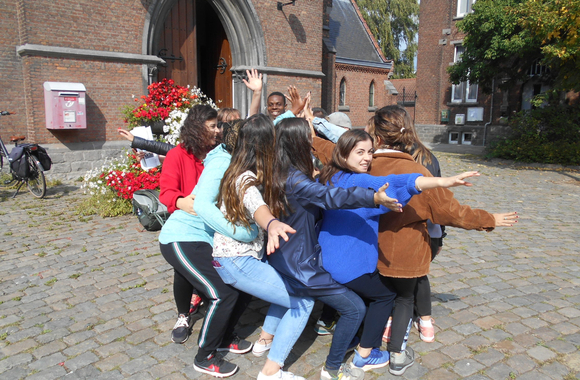

Breadcrumb
International Educating Class (postgraduate certificate)
Education is fundamental for a positive and humane transition into the future and for development that is sustainable. The programme is not just for educators, but for everyone who is committed to become a changemaker, a peacebuilder and a true global citizen.
To change the world, educate the world… start here.
Education is fundamental for a positive and humane transition into the future and for development that is sustainable. Hence, this Postgraduate aims to actively contribute to the realization of the UN’s sustainable development goals (SDGs), particularly SDG4: to ensure inclusive & equitable quality education and promote lifelong learning opportunities for all.
Dynamic and flexible two semester programme
This one-year English-language 60 ECTS credit programme is divided into two (2) semesters of 30 ECTS credits each. You can begin either in the Fall or Spring.
- Fall programme (sept-jan)
- Spring programme (feb-june)
Based on UNESCO inspired values, the programme offers:
- Project-based collaborative group work where students from differing cultures and backgrounds work together towards a common goal
- The programme supports you to become an agent for positive social change and peace, while stimulating the building of capacities you will need to be successful in life and work
- An officially recognized certificate by both the Flemish Ministry of Education and UNESCO. The certificate provides you with an important edge when applying to other institutions of higher education and for employment. The certificate does not lead directly, however, to a teaching certificate or another degree.
- Post-graduate students may visit important international institutions like the International Court of Justice in the Hague; the Headquarters of UNESCO, the International Institute for Educational Planning (IIEP) as well as international and national institutions in Belgium.
Application deadline
- Fall programme
- non-EEA students requiring a study visa: 1 May
- all other students: 15 August
- Spring programme
- non-EEA students requiring a study visa: 30 September
- all other students: 30 November
Fall semester
This one-year English-language 60 ECTS credit programme is divided into two (2) semesters of 30 ECTS credits each. You can begin either in the Fall or Spring. At the end of each Semester, you receive a valuable certificate that is recognized by the Flemish Ministry of Education and endorsed by UNESCO.
- Navigating the complex world (6 ECTS)
- Environmental awareness and sustainable action (6 ECTS)
- Personal growth (3 ECTS )
- Global citizenship & changemaking (6 ECTS)
- Community building (9 ECTS)
Spring semester
This one-year English-language 60 ECTS credit programme is divided into two (2) semesters of 30 ECTS credits each. You can begin either in the Spring or Fall. At the end of each Semester, you receive a valuable certificate that is recognized by the Flemish Ministry of Education and endorsed by UNESCO.
- Learning for life (3 ECTS)
- Between memory & dialogue across cultures (6 ECTS)
- Language, code & culture (3 ECTS)
- Global citizenship & changemaking (6 ECTS)
- Scenarios for living together (5 ECTS)
- Service learning (7 ECTS)
Admission and requirements
As a postgraduate programme in sustainable development education, IEC welcomes students, who have successfully completed a Bachelor’s or Master’s Degree and are interested in developing educational competences as well as professional and personal capacities.
Students are required to have attained a level of English language proficiency based on internationally recognized standards.





















